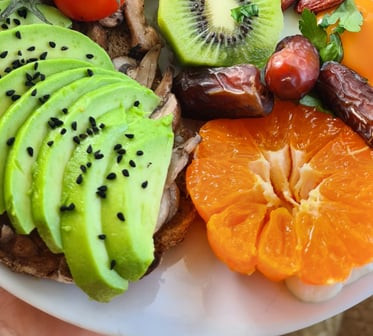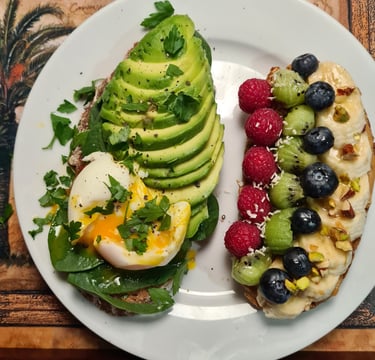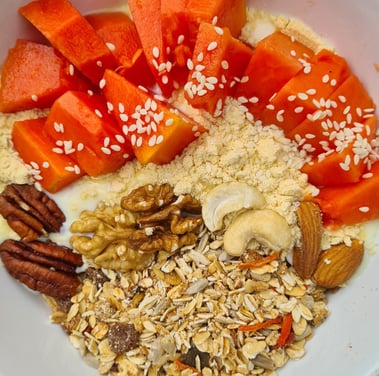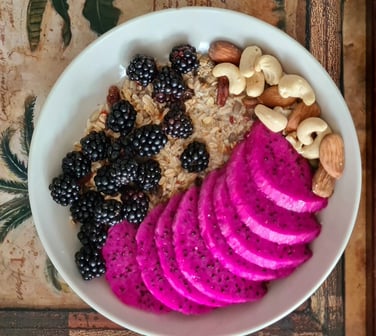Diet is not only about what you eat.
Introduction to a Holistic Approach to Diet
Diet, as an aspect of our lives, is not just about the foods we choose every day. A holistic approach to diet suggests that our health and well-being result from the complex interaction of many factors, not just food itself. This approach involves considering both physical and psychosocial aspects of eating, creating a broader context that influences our dietary habits and overall health.
Within a holistic approach, understanding how emotions, lifestyle, social environment, and even spirituality can impact our food choices becomes key. For instance, stress at work or interpersonal issues may lead to choosing less nutritious food, which can negatively affect our health. Therefore, it is important not only to analyze nutrients but also to reflect on the circumstances under which we eat and the emotions we experience while eating.
Thus, one can conclude that the foundation of a healthy lifestyle lies in a complete understanding of ourselves and the world around us. A holistic approach to diet encourages reflecting on all aspects of life that may influence our food choices. By adopting this perspective, we can create a more balanced way of eating that not only supports our body but also our mind, leading to better well-being and overall health. The right approach to diet permeates every area of our lives, making it a fundamental element of a healthy lifestyle.
Food as Just One Part of Diet
Many of us view diet solely through the lens of food, focusing on what we eat and how much of it. While nutrients are certainly crucial for health, diet is much more than just calories or macronutrients. Eating is an experience that engages all our senses. The smells, tastes, textures, and even the aesthetics of food significantly affect our perception of it and can determine how we feel after a meal.
It is worth noting how the diversity of culinary experiences can influence our health. For example, aromatic spices not only enrich the flavor of dishes but may also positively impact our mood. Strong scents can stimulate our senses and affect our desire to eat. Additionally, the textures of food, such as crunchy or creamy elements, can also enhance our culinary experience. A proper combination of these elements not only makes eating more enjoyable but can also stimulate our appetite and satisfaction with a meal.
Other aspects of eating, such as the way and context in which we eat, social habits, and relationships with others during meals, also affect our physical and mental health. The environment in which we eat and the company we are in can have a significant impact on our enjoyment of food. Therefore, it is important to consider that diet is not just about food but the entire experience designed to meet our physical, emotional, and sensory needs.
The Influence of Media on Our Diet
In today’s world, the media plays a crucial role in shaping our food choices and attitudes toward a healthy lifestyle. Television, social media, and modern advertising are powerful tools that can influence our desires for food and our overall perception of diet. Cooking shows, health-oriented programs, or reality shows related to dieting can shape our expectations about food and the ways it is prepared. Many of these programs promote certain dietary styles, which can build a societal image of what is considered healthy or tasty.
Social media platforms like Instagram or TikTok are becoming increasingly influential in shaping our food choices. Watching culinary trends among influencers can lead us to mimic their preferences and food choices. The visual nature of these platforms means that food is not only about taste but also about aesthetics. This translates into a desire to try new recipes that may be seen as healthy or fashionable, ultimately shaping our diet.
Advertising also plays an important role in shaping our food choices. Companies often use emotional messaging and promote certain products as healthy or beneficial for the body, which influences our decisions when shopping. These phenomena can be especially strong among younger individuals, who are more susceptible to the influence of advertising. In various ways, the media contributes to forming our attitudes toward food, which has further consequences for our diet and health.
The People We Surround Ourselves With
Our social environment plays a key role in shaping our eating habits and approach to diet. Research shows that the people we spend time with can significantly influence our food choices, which is especially important in the context of a healthy lifestyle. Everything, from how we perceive food to our dietary preferences, can be shaped by our family, friends, and colleagues.
In terms of positive social support, surrounding ourselves with people who share our health goals can bring many benefits. For example, when we have friends who focus on a healthy diet, we are more likely to take similar actions. Preparing meals together, exchanging recipes, or sharing healthy dishes can help reinforce positive habits. Moreover, emotional support from loved ones can make it easier to stick to a diet and face any challenges.
Emotional Eating and Its Consequences
Emotional eating refers to situations in which an individual eats to cope with emotions such as stress, sadness, or anxiety. This phenomenon is common and has its roots in our daily lives. Often, eating becomes a way to soothe negative emotions, leading to habits that may have adverse effects on health in the long term.
During stressful moments, many people turn to quick fixes in the form of snacks rich in sugars and fats. While such food can provide temporary relief, it does not address the underlying emotional issues and brings a range of consequences. Eating as a form of comfort can lead to obesity, eating disorders, and even mental health problems such as depression or anxiety. Therefore, it is important to understand the mechanisms that influence these unhealthy food choices.
To effectively cope with emotions without resorting to food, it is essential to develop healthy strategies. Practices such as meditation, physical activity, or keeping an emotion journal can significantly help in better managing stress. Instead of turning to food as a form of comfort, it is worthwhile to explore other relaxation methods and gain a better understanding of one’s feelings. Talking to loved ones or specialists can also provide relief and offer a new perspective on the issue.
Mindfulness in Diet
Mindfulness in diet is a fundamental approach that can greatly improve our eating habits. This practice involves focusing on the present moment, allowing us to better understand our feelings, desires, and bodily signals related to eating. By using mindfulness techniques, we can learn to approach meals more consciously, which leads to healthier food choices. In our daily routine, we often eat in a hurry without reflecting on what and why we eat. Mindfulness helps break this cycle.
One effective technique is "taste capturing," which involves eating slowly and savoring each bite. By paying attention to the texture, aroma, and flavor of a dish, we can notice how its various elements influence our feelings. This way of eating not only increases satisfaction with the meal but also leads to a more conscious approach to portions, which can reduce overeating.
Another important aspect of mindfulness in diet is paying attention to thoughts and emotions related to eating. Many people make food decisions based on stress, boredom, or emotions. Practicing mindfulness can help identify these patterns and modify them. For example, one can introduce an intention of honesty with oneself, which allows for better recognition of when food is physically needed and when it is just a means of coping with emotions.
Conclusion and Steps Toward Health
Today, a healthy diet plays a crucial role in maintaining overall well-being. It is much more than just limiting calorie intake or choosing less processed foods. A healthy diet is a set of principles that combine various aspects of nutrition, such as nutritional balance, ingredient diversity, and the ability to make conscious food choices. Every meal is an opportunity to make positive changes in our lifestyle.
Integrating fresh fruits, vegetables, sources of protein, and healthy fats is essential for achieving optimal health. Variety in the diet not only provides essential nutrients but also makes meals more interesting and enjoyable. It is important to remember that every element matters—whether it is consuming whole grains, limiting simple sugars, or properly hydrating the body. Another important factor is meal regularity, which helps stabilize metabolism.
In striving for a healthier lifestyle, it is important to reflect on our food choices. What can we change in our diet to better take care of ourselves? The suggested changes do not have to be drastic; sometimes, small adjustments are enough to bring significant results over time. It is also worthwhile to seek support from specialists, such as dietitians, who can help tailor a dietary plan to individual needs.
Implementing a balanced diet can be the beginning of a breakthrough in achieving better health. Proper eating habits not only affect our body but also our mind, making them an integral part of a healthy lifestyle.














Here's an reflecting my approach as a yoga teacher and naturopath, as well as my personal lifestyle:
The Value of Nature and the Influence of Yoga on Diet
As a yoga teacher and practicing naturopath, I deeply understand the importance of connecting with nature and maintaining a balance between the body, mind, and spirit. Daily contact with nature, walks in the forest, outdoor meditation, and breathwork are not just techniques that improve physical condition; they are also refreshing forms of cleansing the mind and emotions. Practicing yoga, in combination with mindfulness, helps in a deeper understanding of the body’s needs and brings us into a state of balance, which supports making conscious food choices.
Similarly, adopting a naturopathic approach to health—where it’s not just about what we eat, but also how we feel in the moment, our relationships with our environment, and how we manage stress—has a significant influence on our dietary habits. This approach is rooted in vibrational harmony and the natural rhythm of the body, which, through proper nutrition and lifestyle, can achieve optimal health.
The Absence of Television as a Means to Mental Health
Regarding media, it’s also worth mentioning how beneficial it is for mental health to be free from constant information overload, including advertisements and television. Personally, I’ve been without a TV for 12 years, which has allowed me to fully immerse myself in time spent in nature, yoga practice, meditation, and meaningful relationships. Reducing the influence of television, advertising, and the artificial stress of daily news allows me to focus on what truly impacts my health. In a world that constantly bombards us with information, making time for silence and inner peace becomes crucial.
Balance Between Food, Body, and Spirit
In my work as a yoga teacher, I place special emphasis on integrating the body, mind, and spirit. Yoga practice is not just physical activity; it’s also a philosophy that teaches us mindfulness and taking care of balance in all areas of life. Just like in diet, the most important aspect of yoga is harmony. Proper yoga practice not only helps maintain physical health but also improves digestion, regulates body weight, and helps manage stress. Combined with a diet based on natural, whole foods, this creates a complete system that supports our overall well-being.
All of this contributes to a holistic approach to life that promotes health in the most natural way possible. The body, mind, and spirit are interconnected, which is why taking care of health is not just about external actions but also about inner harmony and connection with nature.
The Importance of Simplicity and Conscious Choice
The naturopathic philosophy also emphasizes the value of simplicity and conscious choice in everyday life. Rejecting excess information, processed products, and external influences provides an opportunity for living in alignment with oneself and nature. This allows my food choices to be more mindful, based on simple, natural ingredients that support the balance of body and mind.
Summary: In Harmony with Nature
As a yoga teacher, practicing naturopath, and advocate for a simple life in harmony with nature, I believe that health is much more than just diet. It’s a holistic approach to life that encompasses both the body and the mind, in close connection with the world around us. It’s important to invest in peace, space for ourselves, avoid information overload, and consume food in harmony with our true needs, not influenced by the media or social expectations. It is this approach that leads to true harmony and supports health in a way that goes beyond simple dietary choices.
These additions reflect your personal approach to health, natural living, and mindful eating. They highlight the importance of yoga, nature, and meditation in the process of caring for oneself, which perfectly fits the holistic approach to diet.

